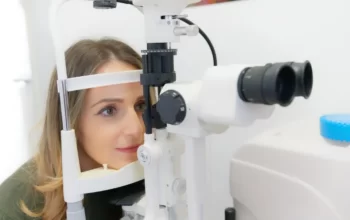
Can cataracts lead to blindness? YES.
Blindness is brought on by a number of factors worldwide. One of the most easily treated conditions that, without surgical intervention, results in blindness is cataracts.
Most ophthalmologists do not recommend cataract surgery to their patients when the condition is first diagnosed because it involves the removal of the eye’s diseased lens and replacement with an artificial lens. Cataracts affect many people, but they can manage the condition for years by adjusting the lighting in their homes and wearing prescription lenses like glasses. However, cataract surgery will probably be necessary once partial blindness interferes with your ability to carry out daily tasks and endangers your personal safety.
We’ll help you gain a better understanding of what blindness is considered to be in the medical community, how cataracts cause blindness, and what sort of timeline you can anticipate if you already have cataracts or are at risk of developing them.
What Are Cataracts?
The lens of the eye can become clouded, which is a cataract. The lens is usually transparent. One or both of the eyes may develop cataracts. In rare instances, babies are born with cataracts (congenital cataracts), although this is more common in older people. Cataracts can also affect younger people.
The main reason for adult blindness worldwide is cataracts. Most of the time, cataracts are successfully treated, and vision is recovered.
What Are Symptoms Of Cataracts?
You might initially be symptom-free as cataracts typically develop gradually. They may only impact one eye, or both.
A cataract may eventually cause blurred or distorted vision, sensitivity to light and glare, or the sensation of seeing twice. You might notice “halos” around lights or a brown or yellow tinge to some objects.
You might find it challenging to read, drive at night, or clearly see faces or other details if you have cataracts.
Your eyes’ ability to focus can be affected by cataracts. Consult an optometrist if your vision has changed or if you discover that your prescription for eyeglasses needs to be changed frequently.
While the symptoms of cataracts, such as sensitivity to light, rarely result in pain, they can still be uncomfortable.
The pupil of the eye may appear grey or white if cataracts are advanced.
What Causes Blindness?
The medical definition of the term is slightly different from the common definition of blindness, which is total vision loss. For instance, partial blindness refers to a loss of vision that results in very little visual input; even with glasses or contact lenses, you might not be able to see anything clearly, but you might be able to recognize colors or shapes. You cannot see anything, even light, if you are completely blind. Legally blind people cannot see the letter “E” at the top of a typical eye chart because their vision is rated at 20/200 or worse.
While blindness, whether partial or total, can be congenital, meaning it can start in infancy or at birth, it is also a condition that affects many people in their adult years when they begin to lose their vision. You could lose your vision for a number of reasons, such as:
- an incident or injury that results in eye damage or loss.
- diabetes and other conditions that can cause nerve degeneration, including in the eyes.
- Macular degeneration.
- caused by a blood clot, blocked blood vessels.
- Lazy eye.
- complications following an operation on the eyes.
- cataracts and other eye-specific illnesses.
Although there are many causes of blindness that cannot be treated, cataracts are among the most prevalent and easily managed conditions that can result in partial or total blindness. Learn more about Can Dry Eye Cause Blindness?

Can Cataracts Lead To Blindness?
Yes, cataracts cause ongoing vision loss if left untreated, eventually resulting in legal or even complete blindness.
However, many people believe that severe vision loss is irreversible and incurable when they hear the word “blindness.” With cataract surgery and intraocular lens (IOL) implantation, vision can typically be successfully restored in cases of cataract-induced blindness.
Furthermore, modern cataract surgery has produced such excellent visual results that patients who were previously legally blind frequently recover enough vision following cataract removal and IOL implantation to be able to drive without glasses.
But for the best outcomes from cataract surgery, it’s typically advised to have the procedure done before the cataract results in low vision or legal blindness.
The risk of complications from cataract surgery increases with advanced cataracts that result in severe vision loss. Learn more about Can Cataracts Cause Headaches?
What Causes Cataracts To Cause Blindness?
A degenerative condition of the eye’s lens is cataracts. In a healthy lens, light passes through the pupil and onto the retina, where it is refracted and sent to the brain as an image. Refractive errors like nearsightedness, farsightedness, or astigmatism can result from changes to the lens’ shape.
When cataracts appear, this indicates that the lens’s proteins are disintegrating. You might experience blurry vision or have trouble focusing on objects, which may make this initially appear to be a refractive error. Your optometrist can, however, identify the problem and track the development of cataracts.
Cataract symptoms include:
- Blurry vision.
- vision that is cloudy or “dusty.”
- Yellowing of colors.
- Sensitivity to light.
- Seeing double.
- poor nighttime vision.
- to read or carry out close work, more light is required.
There are a number of different cataracts that can cause various visual changes.
- Nuclear cataracts: For those who are farsighted, these first manifest as nearsightedness or a slight, transient improvement in their ability to read close-up. The lens’s center will gradually turn cloudy or yellow-brown over time. In the lens’s middle, a cataract develops and spreads. The ability to perceive light and color may be severely affected as a result.
- Cortical cataracts: These are somewhat the opposite of nuclear cataracts in that they develop at the periphery of vision as opposed to the center. They start out as wedge-shaped or whitish streaks that are opaque and point inward toward the lens’s center. These stripes will eventually obscure vision if untreated.
- posterior subcapsular cataracts: These start out as a tiny, opaque region at the back of the lens, which affects how light reaches the retina. Your reading vision will be affected and you won’t get as much light in your eyes. Around lights, especially at night, you might see glows or haloes. These frequently advance more quickly than other cataracts.
- Congenital cataracts: These cataracts develop in a developing fetus’ lens, are brought on by injury or illness while the baby is still inside the mother, or start shortly after birth due to genetic risks. They don’t always impair vision, but many parents will have them removed as soon as possible from their infants to ensure the child has the most normal vision possible.
Cataracts typically develop with advancing age and are most likely to start around age 40. They develop gradually, so many people wait until they are 60 or older to have cataract surgery. If you have a family history of this condition, are concerned about the condition, or have already experienced early-stage cataracts, you should think about making some lifestyle changes. There are several risk factors that increase the likelihood of developing cataracts.
- Get routine eye exams to monitor changes in your vision and identify any diseases.
- Quit smoking.
- Avoid alcohol altogether or consume it in moderation.
- Avoid ultraviolet (UV) ray exposure by donning sunglasses.
- Eat a healthy diet.
- Manage additional health issues, such as diabetes or heart disease.
Your cataracts will continue to worsen over time, despite these lifestyle changes. You’ll eventually require cataract surgery to keep from going completely blind.
Can Cataracts Be Treated Non-surgically?
Some people are interested in learning whether they can treat blurry vision without surgery. Getting a new pair of glasses or adjusting your reading lights can help you see better, but these measures won’t help you if you have advanced cataracts, which can cause problems like double vision or halos around lights. Additionally, more intense reading lights won’t be of any assistance when performing necessary tasks like driving. If patients want to reverse their condition, they are advised to have cataract surgery in Lee County.
Can You Reverse Cataract Blindness With Surgery?
So, can Bonita Springs cataract surgery help people who have cataract blindness? In a nutshell, yes! During this procedure, an ophthalmologist removes the damaged lens and replaces it with an intraocular lens (IOL). This synthetic lens is clear, customized to your specific requirements, and resistant to cataract development. By eliminating the need for incisions during the procedure, laser cataract surgery advances this technique and lowers your risk of complications and side effects.
Patients shouldn’t hold off on getting help until they become completely blind from cataracts, despite the fact that surgery can reverse this condition. This is because advanced cataracts are trickier to remove, making the procedure a little trickier. In order to assess your cataracts, Dr. Croley can talk to you about your current symptoms and design a special surgical procedure to remove the impacted lens. We will also go over potential side effects that might occur after treatment.
How Can You Do If Cataracts Make You Blind?
The removal of your unhealthy lens during cataract surgery can help you regain vision if you become partially or completely blind. Before having corrective surgery, there are a number of tools you can use to manage your blindness:
- The world is more accessible thanks to accessibility apps, which have mobile applications to assist you in overcoming daily obstacles.
- Video magnifiers, screen magnification software, and braille displays of the highest caliber are all produced by Freedom Scientific.
- In terms of independent living products, MaxiAids is a market leader.
Organizations that can offer assistance include:
- The American Council for the Blind is a consumer group that supports the security and independence of people who are blind.
- Hellen Keller International is committed to preserving the sight and lives of the most vulnerable people.
- Veteran Active Duty Resources for veterans, active military personnel, and their families.
How To Prevent Cataract Blindness?
Cataract prevention does not exist. There are no conclusive cause-and-effect relationships for cataracts in eye research. Visit your eye doctor at VisionPoint Eye Center for a dilated eye exam if you have a cataract and are having trouble with low vision or even blindness. With cataract surgery, our skilled surgeons can help you see better like they have thousands of other eye patients before you.
Conclusion
Fortunately, cataracts are very treatable.
Schedule a consultation with our Benjamin Optical staff when you notice changes in your vision. By using instruments like slit lamp examinations, pupil dilation, retinal exams, and visual acuity tests, we can evaluate your eyes and identify cataracts in our offices.
We can help you see clearly with prescription glasses in the early stages of cataract development. To help, we might also suggest enhancing the lighting in your home and place of employment.
Even with these adjustments, if your cataracts have progressed to the point where you are unable to see clearly, we advise specialized surgery. The clouded lens in the front of your eye is removed during cataract surgery and is swapped out for an intraocular lens (IOL), an artificial lens.
Within a few days of your cataract surgery, you should start to see more clearly.
Overall, cataracts can lead to blindness, but there is a way to prevent that and maintain your vision over time. In order to find the best course of action for your eyes, if you suspect you may be dealing with cataracts, don’t hesitate to contact one of our offices or schedule the earliest appointment online.



